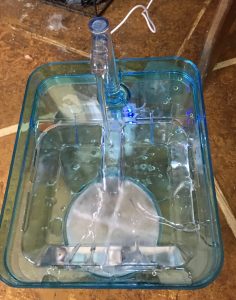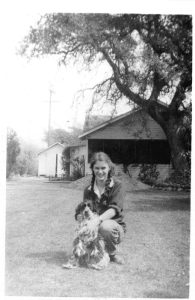(A reprise post from … gulp… 2004)
It really takes a gift to find yourself on a soggy-wet mountainside on a Sunday afternoon in December, 1981, with a fine drizzle coagulating out of the fog in the higher altitudes, slipping and sliding on a muddy deer track with a tree saw in one hand, and leading a sniffling and wet (inside and out) toddler with the other.
Yep, it’s a gift all right, born of spontaneous optimism and an assumption based on the map on the back page of the Sacra-Tomato bloody-f#$*%^g Bee newspaper, and a promise to Mom. Said map made the %$#*ing Christmas tree farm look like it was a couple of blocks, a mere hop-skip-and-jump from the back gate of Mather AFB’s housing area, an easy jaunt on a pleasant Sunday afternoon, a lovely and traditional Christmas pastime, choosing your own tree from the place they were growing in!
I was taking leave the next day, and driving home to Hilltop House from Sacramento, and my job in the Public Affairs office. It would only be the second Christmas I had spent at home with Mom and Dad since going on active duty (and it would be the last one for ten years). And Mom had made a confession;
“I haven’t gotten the tree yet. The ones at the lot look horrible, all but dead.”
“I’ll buy one here and bring it down, “I said, spontaneously. “There was a bit in the paper this morning about a local Christmas tree farm. I can tie it to the roof rack.” My car of the moment was a VW station wagon with an immaculate interior and a very useful roof rack. If it didn’t fit into the back, like the unfinished chest or drawers I had bought for my daughters’ room, it went up on top, lashed about with bungee cords and rope. I had brought home a lot of stuff that way.
“Perfect, “said Mom. “Stick the trunk end in a bucket of water overnight, so it won’t dry out on the way down.”
We set out bravely enough, early in the afternoon, my daughter strapped into her car seat, and the map from the newspaper open on the passenger seat, where I could refer to it, easily. Past the housing area BX shopette and gas station, out the gate, a couple of turns, and there we were, tooling along a pleasant country road in the mild winter sunshine. On the map it looked as if I would stay on this road for a couple of miles, until it intersected with another road, one with a couple of wiggles in it… into hills, perhaps? It looked as if the tree farm were out in the country and fairly easy to find, not hidden in a jumble of other businesses, intersections and traffic. Soon, empty fields and meadows opened up around us… stood to reason a Christmas Tree farm would be out in the country. Maybe the next mile or two would bring me to the turn-off, the road with a couple of wiggles in it…
Fifteen minutes… twenty minutes… half an hour, still no intersection. Forty-five minutes, and it was very clear that the map was deceptive about the distances. I had gassed up in anticipation of the long drive the next day, so that was not a problem, but if I had not already told Mom I would come home bearing a fresh-cut Christmas tree, I would have turned around and gone back. An hour went by, and the road began to climb. Good heavens, we were nearly to the gentle dun-colored foothills, where the clouds had begun to pile up against distant jagged blue mountains of the Sierra Nevada. At last— an intersection ahead! I slowed down to verify against the map. Yes, the right one. Pretty soon, it began to climb, looping farther and higher into the hills, up into the cloud layer. I ran the wipers to clear away condensation, hoping that the distance along this new road was not as deceptively mapped. I had definitely not counted on two hours there and back. This had better be worth it.
There was a sign, at least… a sign, a gap in the undergrowth, a dirt road leading up into the trees, but the condensation had become a drizzle by the time I pulled into a parking lot, which was merely a couple of cars haphazardly stopped in a roughly mown field around a plain red-painted shed with a deep overhanging roof. The door was open, there were people there, but not as many as there were cars.
“Here, “said a teenaged girl at the cashbox. She handed me a tree saw, and a mimeographed sheet with sketches of the various types of trees with attention to their needles, and a list of prices— so many dollars per foot of tree. “Just cut down the one you want, bring it back here and we’ll figure the price.”
I took the saw, and stuffed the sheet in my shoulder bag, and looked around.
“Where are the trees?”
She pointed out the door, where the dirt road continued up to the top of the hill.
“Up there. They’re all over. Just find one you like.”
My daughter began to lag, halfway up the hill. I looped the tree saw over my arm, and picked her up. The ground was very wet, either sloppy mud, or slippery grass. We had at least come away from the house with coats, but my light-weight tennis shoes were soon saturated. Coming down the slope on the far side, I skidded and sat down rather heavily. Great, now I was wet and muddy to the waist, as well as my daughter. The trees were scattered, not in neat, easily accessed rows, among taller trees and long thickets of grass. It began to rain. I had to put my daughter down and let her walk, but she was not happy about that, and began to sob, quietly.
We would have to find a tree, soon… and close enough that I could drag it… and the saw… and my poor daughter back to the shed. The most convenient trees were either too large, or the more expensive varieties.
There… there was a tree, with the long graceful bunches of needles. It sat on a slope, but it was just a little taller than me. I sat my daughter down, and put my purse in her lap—
“Here, watch this, for Mummy,” and picked a place on the tree’s trunk, about four inches above the clay and clinging soil, put the saw to it and went to work. Mercifully, it only took a few vigorously-expended minutes. I slung my purse and the saw over my arms, picked up the tree and my daughter, and began the long, unhappy, sodden forced-march up over the top of the hill and down towards the sales hut. Some Christmas excursion— wet, pissed-off, on a soggy mountainside with a lopsided Christmas tree, a wet and wailing toddler, and a hour-plus drive, and a longer one in the morning… oh, Christmas tree!
I did soak the trunk of it in a bucket of water, before lashing it to the luggage rack for the drive south the next morning, though that may not have made much difference.
“It’s so fresh!” Mom said, rapturously. “It smells marvelous! Never mind about the flat place, we’ll put that against the wall, and no one will ever know… really, I wonder how long it’s been since the ones in the lot have been cut! I really wonder about that, now.”
“You probably don’t really want to know, “I said. “Merry Christmas… and you owe me $10.”
“Is that all?” Mom said.
“Oh, yeah, “I replied. “That’s all. Merry Christmas.”



Recent Comments